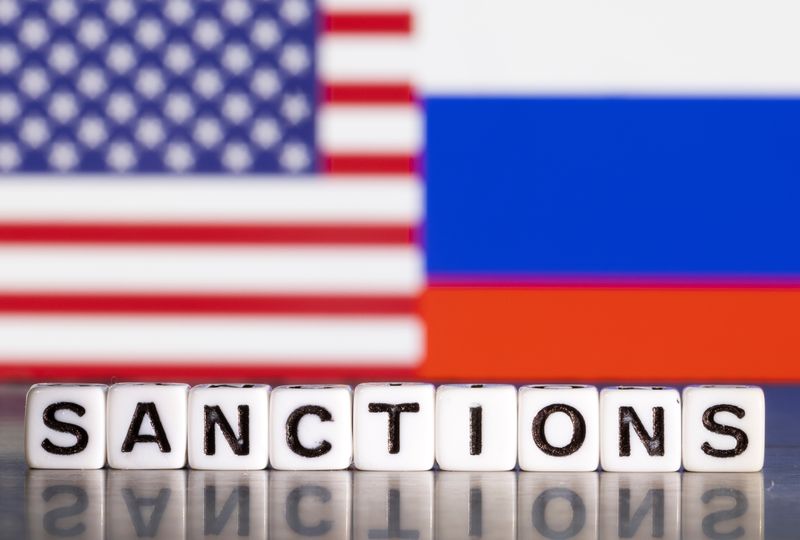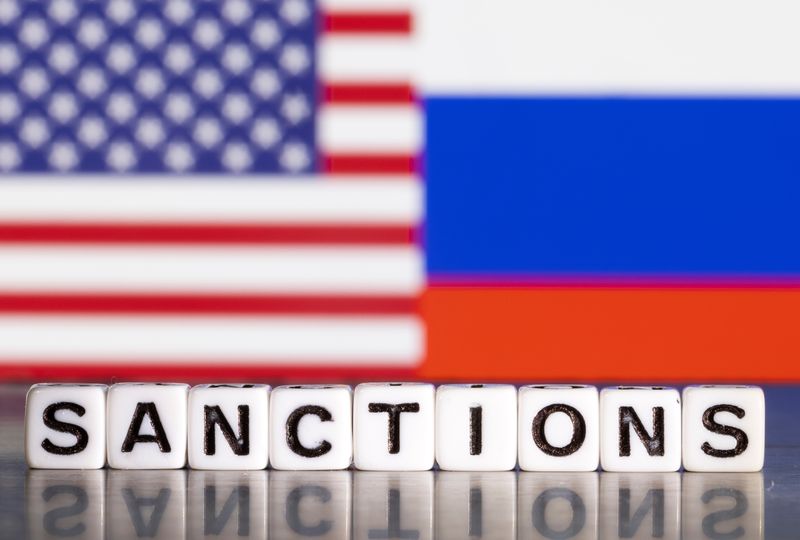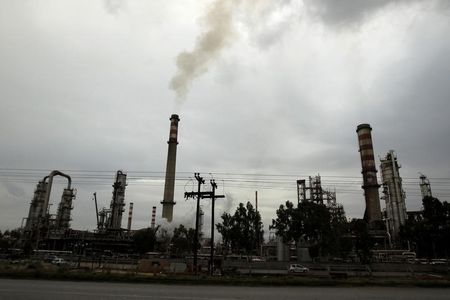Commodities
Russia oil fleet shifts away from Liberia, Marshall Island flags amid US sanctions crackdown


© Reuters. File photo: Plastic letters arranged to read “Sanctions” are placed in front the flag colors of U.S. and Russia in this illustration taken February 28, 2022. REUTERS/Dado Ruvic/Illustration/File photo
By Jonathan Saul and Timothy Gardner
LONDON/WASHINGTON (Reuters) -Dozens of oil tankers used by Russia have stopped sailing under the Liberian and Marshall Islands flags in recent weeks after the United States ramped up sanctions enforcement on ships linked to those registries, according to shipping data and interviews with industry and government officials.
The shift reflects the close relationship between the U.S. and the flag administration companies of Liberia and the Marshall Islands, which are headquartered not in their home countries, but in Virginia, just miles from Washington D.C. and within the jurisdiction of U.S. sanctions enforcement.
The heavy past use of those flags also represents a potentially lasting vulnerability for Russia’s oil fleet, whose tankers will remain liable for sanctions violations even after they have switched to a new flag outside of U.S. reach, according to energy and sanctions specialists.
“They’ve created an enduring liability and enduring risk,” said Craig Kennedy, a center associate at Harvard University’s Davis Center for Russian and Eurasian Studies.
Commercial ships must be registered, or flagged, with a particular country to ensure they are complying with internationally recognized safety and environmental rules.
Reuters analyzed LSEG and Lloyd’s List Intelligence shipping data, and interviewed government officials, flag registry representatives and shipping analysts to provide previously unpublished details on the role of flag registries in the recent wave of U.S. sanctions announcements targeting Russia’s oil fleet, and the vulnerabilities they pose to Russian oil shipping.
The G7, the EU and Australia imposed a $60 a barrel price cap on Russian oil exports in December 2022 as part of wider economic sanctions aimed at cutting Moscow’s revenues without disrupting global energy supplies, following Russia’s invasion of Ukraine.
The cap bans the use of Western maritime services when tankers carry Russian oil priced at or above the cap. A U.S. official, who requested anonymity when speaking about the sanctions, confirmed that the Liberian and Marshall Islands flag registries qualify as Western services.
Since October, the U.S. Treasury Department has imposed sanctions on some 41 oil tankers for Russian price cap violations, 24 of which were flying the Liberian flag and one of which was using the Marshall Islands flag.
Almost all of the other tankers were flagged in Gabon, including 12 of the 14 targeted by the Treasury Department in its most recent bundle of sanctions on Feb. 23. Of those Gabon-flagged tankers, in which Russia’s top shipping company Sovcomflot (SCF) has an interest, at least three had recently flown the Liberian flag, according to Reuters’ analysis of shipping data.
Those tankers were among a slew of ships in the SCF fleet moving to Gabon, according to the data: as of early February, SCF had 42 tankers in its 147 tanker fleet that had recently shifted to the Gabon flag, mainly from Liberia and Panama.
SCF declined to comment and Russia’s transport ministry did not respond to a request for comment.
The Liberian flag registry told Reuters that all the Liberian-flagged vessels which were sanctioned were in the process of having their Liberian flags removed. “We are all living in a different world right now and the registries need to adapt to what the global situation is at this point,” the Liberian registry said.
The registry declined to comment on its previous business with SCF.
A U.S. official told Reuters that Liberia had been actively engaged with the Treasury Department, and that sanctioned tankers have about a three-month wind down period to switch to another flag.
Marshall Islands registry officials are also in contact with U.S. agencies on the issue, a Marshall Islands registry spokesperson said.
Gabon Transport Minister Loic Moudouma confirmed to Reuters that many tankers had left the Liberia registry for Gabon recently, and said Gabon would de-list them if they are found to be engaged in illegal activity.
“We are not a flag registry for the world’s rogue navigators or transporters,” he said.
“If any ally, any partner in the world, realizes that there is a Gabonese ship flying the Gabonese flag and carrying out illegal activities, all they have to do is send us the file in full and we will take steps to remove the flag from this ship ourselves. Whether Russian or any other nationality.”
Panama officials did not respond to a request for comment.
INVITING TROUBLE
The sanctions imposed so far have sent a chill through the industry involved in Russian trade.
Many of the still to be de-listed Liberian-flagged vessels, for example, are stuck, sitting at anchor outside of ports across the world including in the Black Sea, according to shipping data, marking a costly liability for their owners and those financially linked to their cargoes.
U.S. Treasury Department sanctions can have a “contagion” effect on tankers by dissuading market players from dealing with them, according to Harvard’s Kennedy.
“In the dollar denominated world of oil trading, why put a deal worth tens of millions of dollars at risk by using a blocked tanker? You’re just inviting trouble for everyone involved,” he said.
Switching to the Gabon flag could also invite additional risk at ports for tankers carrying Russian oil.
A U.S. official said tankers that carried Russian oil above $60 that switch to the Gabon flag could also have a more difficult time with port authorities concerned about the safety of ageing tankers.
The United States, European Union and UK issued a letter late last year pressuring Liberia, the Marshall Islands and Panama to increase oversight of ships carrying their flags to ensure they do not transport Russian oil sold above the price cap, a source told Reuters at the time.
While the U.S. has been the primary enforcer of the price cap, other countries in the mechanism are working with Washington to tighten the screws.
“We’re making it harder for Russia to use its shadow fleet, which in turn would force more volume back into the G7 fleet, where service providers are compliant with the cap,” Olga Dimitrescu, an official at the UK Treasury’s sanctions enforcement arm OFSI told a Feb. 1 podcast with ship insurer NorthStandard.
U.S. officials say shipping practices related to the export of Russian oil above the West’s price cap are in their crosshairs. “We are very concerned about evasion, I think that’s clear from the actions we’ve taken,” Claire McCleskey, an official with the U.S. Treasury’s sanctions enforcement arm OFAC, told a New York shipping conference last month.
“You can anticipate our continuing to take action.”
Commodities
Oil set for weekly gain on signs of improving demand

By Shariq Khan
NEW YORK (Reuters) – Oil prices rose in Asian trading hours on Friday, with global benchmark Brent set for its first weekly increase in three weeks on signs of improving global demand and slowing inflation in top oil consumer the United States.
prices rose 21 cents, or 0.3%, to $83.48 a barrel by 0018 GMT. U.S. West Texas Intermediate (WTI) crude futures rose 18 cents, or 0.2%, to $79.41 a barrel.
Brent futures are set to rise about 1% on a weekly basis, and WTI futures are set to gain 1.4%.
Recent declines in oil and refined products inventories at major global trading hubs have created optimism over oil demand growth, reversing a trend of rising stockpiles that had weighed heavily on prices in prior weeks. Through Thursday, Brent crude futures were down around 10% from this year’s peak of $92.18 a barrel on April 12.
U.S. oil and fuel inventories fell last week, while Singapore’s middle distillate fuel stocks dropped to a near three-month low this week. In Europe’s Amsterdam-Rotterdam-Antwerp trading hub, gasoline stocks were down 7.5% in the week to Thursday, data from consultancy Insights Global showed.
Recent economic indicators from the United States have fed into the optimism over global demand. U.S. consumer prices rose less than expected in April, data showed on Wednesday, boosting expectations of lower interest rates in the country.
Those expectations were further bolstered by data on Thursday that showed a stabilizing U.S. job market.
remove ads
.
Lower interest rates could help soften the U.S. dollar, which would make oil cheaper for investors holding other currencies and drive demand.
“Financial markets now have placed the most bets on a September interest rate cut by the Federal Reserve, which would continue to temper the dollar strength and shift that strength over to commodities and equities,” StoneX oil analyst Alex Hodes said on Thursday.
Commodities
Goldman Sachs discusses what’s next for natural gas prices

Over the past three weeks, US prices have surged 30% to above $2.50 per million British thermal units (mm/BTU), fueled by production declines and increased feedgas demand for liquified natural gas (LNG) exports.
Moreover, recent producer cuts, maintenance events, and Freeport LNG’s normalization of gas demand post-outage have contributed to this rise. Cheniere’s announcement of no heavy maintenance for its liquefaction trains this year also supports higher prices.
In a Thursday note, Goldman Sachs strategists said the return of gas prices above $2/mmBtu aligns with their expectations, as production curtailments “would ultimately lead to lower storage congestion risks for this summer.”
“That said, we see only limited further upside from current levels, with stronger gas prices risking a return of congestion concerns,” they added.
Goldman notes that prices above $2/mmBtu reduce gas competitiveness compared to coal, with a $0.50/mmBtu increase potentially cutting gas demand by 1 billion cubic feet per day (Bcf/d), especially in shoulder months.
Moreover, higher prices may prompt the restart of previously shut-in wells. EQT (ST:), the largest producer in the Appalachia region, indicated it would resume production if prices sustainably exceed $1.50/mmBtu. And while Appalachia prices haven’t risen as much as NYMEX, the local hub has averaged $1.44/mmBtu month-to-date, up 10¢ from last month, strategists highlighted.
Elsewhere, European gas prices have also risen this summer, though less sharply than in the US.
Title Transfer Facility (TTF) prices increased 18% over the past three months to around 30 euros per megawatt-hour (MWh), holding steady in May.
remove ads
.
However, unlike the US market, this rally lacks fundamental support, with Northwest (NW) European gas storage at record-high levels, Goldman strategists pointed out.
“To be sure, NW European LNG imports have remained weak relative to last year – and are likely to get weaker in the coming weeks owing to a seasonal decline in global LNG production, exacerbated by outages at Australia’s Gorgon export project,” they said.
“Going forward, we expect healthy non-European demand for LNG to continue to incentivize a decline in European LNG imports vs last year,” they continued.
Commodities
Gold prices trim some weekly gains on tempered rate cut hopes

Investing.com– Gold prices fell slightly on Friday, trimming some of their gains for the week as comments from a slew of Federal Reserve officials offered a more sobering outlook on interest rate cuts.
The yellow metal had risen to nearly $2,400 an ounce this week in the immediate aftermath of some soft U.S. economic readings. But it pulled back from these levels on Thursday and Friday.
steadied at $2,377.40 an ounce, while expiring in June fell slightly to $2,381.10 an ounce by 00:19 ET (04:19 GMT).
Gold retreats as Fed officials downplay rate cuts, but weekly gains due
The yellow metal fell on Thursday after a string of Fed officials cautioned against bets on immediate reductions in interest rates.
Several members of the central bank’s rate setting committee said the central bank will need much more convincing that inflation was coming down beyond a marginally soft inflation reading for April.
This saw traders begin pricing out some expectations for a rate cut in September. The and also rebounded from earlier losses this week.
Still, some softer-than-expected readings put gold on course for a 0.7% weekly gain.
The yellow metal was also in sight of a record high of above $2,430 an ounce, although it appeared unlikely the level would be met in the near-term.
Other precious metals retreated on Friday, but were set for bumper weekly gains. fell 0.2% but were trading up 6.2% for the week, while fell 0.4% but were up 4.5% this week.
remove ads
.
Copper mixed amid middling China cues
Among industrial metals, one-month copper futures tumbled from two-year highs tracking middling economic data. But three-month copper futures pushed higher and were set for a stellar week as markets bet on tighter supplies and an eventual demand recovery in the coming months.
on the London Metal Exchange rose 0.6% to $10,445.0 a ton, while rose 0.3% to $4.8935 a pound.
Data from China on Friday painted a mixed picture of the economy. While grew more than expected, growth slowed and shrank at an accelerated pace. Growth in Chinese also slowed.
The readings presented a muddled outlook for the world’s biggest copper importer, as it rolled out more stimulus measures to shore up growth.
Three-month copper futures gained on the prospect of a demand recovery, and were up nearly 4% this week. They were also at two-year highs.

 Forex2 years ago
Forex2 years agoForex Today: the dollar is gaining strength amid gloomy sentiment at the start of the Fed’s week

 Forex2 years ago
Forex2 years agoHow is the Australian dollar doing today?

 Forex1 year ago
Forex1 year agoUnbiased review of Pocket Option broker

 Forex2 years ago
Forex2 years agoDollar to pound sterling exchange rate today: Pound plummeted to its lowest since 1985

 Cryptocurrency2 years ago
Cryptocurrency2 years agoWhat happened in the crypto market – current events today

 World2 years ago
World2 years agoWhy are modern video games an art form?

 Stock Markets2 years ago
Stock Markets2 years agoMorgan Stanley: bear market rally to continue

 Economy2 years ago
Economy2 years agoCrude oil tankers double in price due to EU anti-Russian sanctions

































